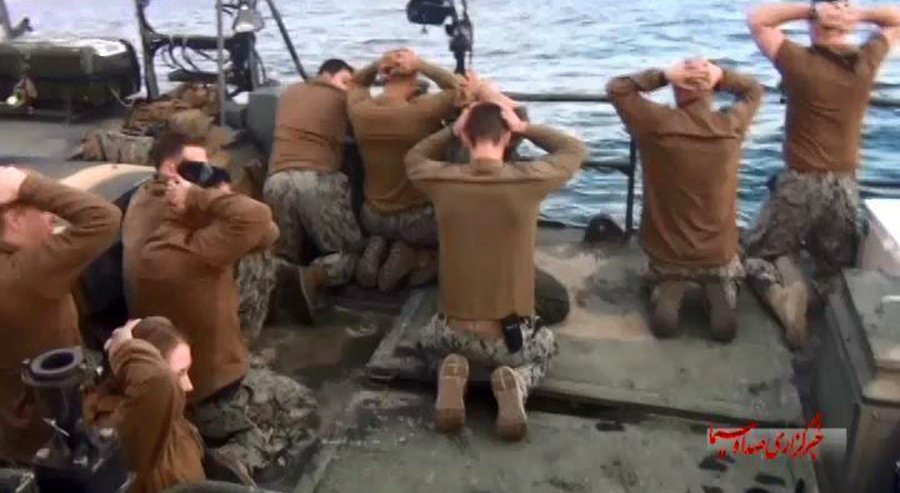Alwaght- Over the past few days, Western media outlets close to United States decision making centers have reported on tensions between US Naval forces and Iran's Islamic Revolution Guard Corps IRGC Naval forces.
Questions are being raised as to why the US has decided to publicize these naval incidents which point to escalating tensions between navies of the two countries. On the other hand, which of the two navies is provoking the other and igniting tensions?
Western media outlets have been implying that Iranian naval forces are involved in adventurous military provocations but the fact is that US forces in the region are deliberately provoking Iranian forces. By provoking Iran, the US seeks to solve its security challenges in the region. As a proof of these view, recently two US spy planes flew within a mile of Iranian airspace, and received warnings of a potential shoot down should they breach it.
On the other hand US warships at the Persian Gulf come dangerously close to Iranian waters and expect the country's forces to watch the provocations silently.
Washington rejects the fact that its naval forces are provocative while at the same time saying that senior military officials at the Pentagon should engage Iran in direct talks to solve outstanding security issues.
US unable to deter Iran's military power
As a matter of fact, the US is unable to deter Iran's military power in the Persian Gulf and now wants to enter into some sort of talks with Iran to contain the Islamic Republic and avoid what a US naval commander once called, 'nightmarish Iranian speed boats'.
US pursues military provocations and igniting tensions to spread instability in the region and thus justifying the presence of its forces in the Persian Gulf Region while continuing its Iranophobia project.
Washington is also interested in establishing a hotline with Tehran with the objective of convincing Iran not to react when US forces conduct adventurous military provocations in the region.
Officials in Washington have claimed that on 10th of September, a US Navy spy plane, P-8 Poseidon, with a crew of nine and an EP-3 Eries with a crew of roughly 24, was on mission 13 miles off the coast of Iran, in the Strait of Hormuz when it received warning from Iranian naval forces.
The officials added that at some point during the flight, the Iranian military warned the two aircraft to change course or risk getting shot down.
According to reports, the US military planes ignored the warning and continued flying close to Iranian territory.
“We wanted to test the Iranian reaction,” one US official told Fox News when asked why the US jets were flying close to Iran.
Despite the fact that there were no Iranian missile launchers in the area, US official said the Iran's response was “unprofessional.”
Iran's chief Armed Forces spokesman has dismissed as untrue the US harassment claims and said the Islamic Republic’s naval forces act according to international law.
Iranian Forces Respect International Laws
“Vessels belonging to the Islamic Republic of Iran are fully aware of international laws and regulations and have always acted based on stipulated standards, so the [US] claims are not only fictitious, but stem from their fear of the might of the Islamic Republic of Iran's forces,” Deputy Chief of Staff of Iran's Armed Forces Brigadier General Massoud Jazayeri said.
Recently, a senior Iranian commander, Maj. Gen. Rashidi, pointed out that Iranian air force is closely monitoring the country's airspace to identify and eliminate any unauthorized entry or intrusion.
The latest incident between the US military and Iran is just the latest in a series of confrontations in Persian Gulf. The US Navy recently aired a video claiming Iran's Islamic Revolutionary Guard Corps IRGC speedboats harassed four American vessels patrolling the Persian Gulf.
US officials claim that there have been more than 30 close encounters between US and Iranian vessels in the Persian Gulf so far this year.
To avoid risky confrontations between Iranian and US Naval Forces in the Persian Gulf, Chief of Naval Operations John Richardson repeatedly has stressed the need for the US and Iran to come to an understanding about encounters at sea.
The incidents at sea are "destabilizing things, and risking tactical miscalculations," that could result in injury, the loss of ships, and the loss of life, Richardson said.
The Islamic Republic maintains that its military might poses no threat to other countries, stating that its defense doctrine is merely based on deterrence.
Iran has also repeatedly announced that it is capable of establishing security in this vital and strategic region, especially with the cooperation and coordination of regional countries and thus there is no need for the presence of trans-regional forces to secure the Persian Gulf region.



























